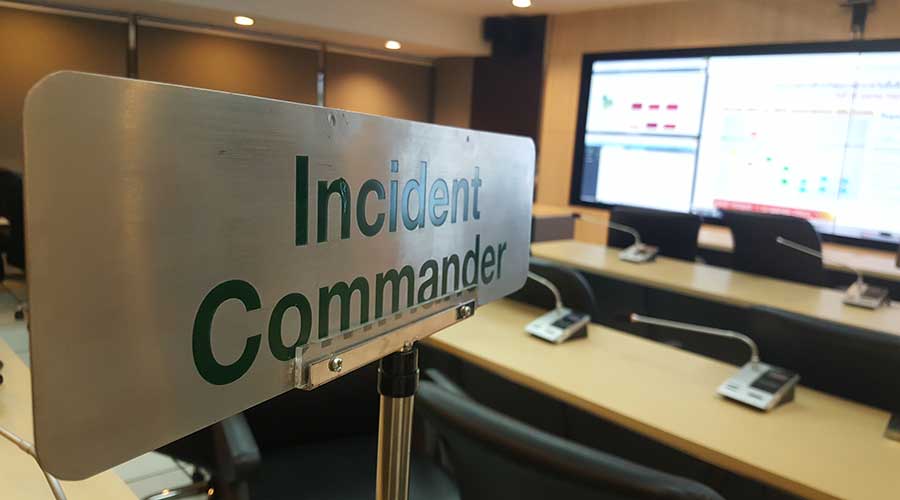The Healthcare Incident Command System (HICS) helps healthcare organizations plan for and respond to incidents or disruptions to patient care in their facilities. These events might come in the form of extreme weather, a utility failure or damage to structures within the hospital. In other situations, like the COVID-19 pandemic, organizations might choose to have a standing incident command team.
The HICS is a structured approach designed to help leadership oversee operations, medical care and facilities during incidents. To provide valuable advice to the incident commander, it is important for healthcare facility managers to understand the HICS and their role in it.
Spotlight on training
Before joining the incident command team, healthcare facility managers should begin to collect information and seek training opportunities to prepare for an event. One recommended practice is to seek out the organization’s emergency manager, who is a valuable resource in explaining certain risks to the hospital and overall response plans. This step gives a facility manager a general understanding of the way the hospital might operate in a crisis.
Another resource for managers is the first-responder services within the hospital or campus, such as a police or fire department. Consulting with those chiefs enables the facility manager to understand operations and the way the facilities department can support them in case of emergency.
Training also is a critical consideration for facility managers. The Federal Emergency Management Agency (FEMA) provides free training. The courses are available online, and the more advanced courses can be completed in person. The following FEMA courses are recommended for facilities managers and engineers who have a role in the HICS:
- IS-00700.a National Incident Command System
- IS-00800.b National Response Framework, an Introduction
- IS-00100.c Introduction to the Incident Command System, ICS-100 for Federal Workers.
Understanding roles
Within the HICS, facility managers fall under operations and act as the infrastructure branch chief. Their primary responsibilities focus on the safety and maintenance of lighting, buildings, grounds and the built environment. The branch chief must keep the head of operations abreast of utility outages, as well as progress of various projects required by the emergency. The infrastructure branch chief must be aware of utility redundancies and provide the operations chief with structural evaluation as needed.
Consider the importance of the infrastructure branch chief by looking at the temporary screening and treatment facilities established during COVID-19. At the Coatesville, Pennsylvania, Veterans Affairs Medical Center, screening points and vaccination sites required determinations related to temporary and permanent structures, as well as space allocation and course-of-action comparison. Also, various aspects of HVAC systems became important with a respiratory virus such as COVID-19.
The infrastructure branch chief might consult directly with the incident commander. For example, when determining the layout, cost and utilities for a temporary drive-through vaccination site, I was required to brief the incident commander daily on courses of action.
The facility manager also can be the chief of operations. One example of this instance is if the incident is related to construction activities. At our facility, we activated the HICS for a critical crane lift. This process included evacuating the building and involved multiple parties, including police, fire, engineering, safety and leadership.
Lifting a temporary elevator into place required closing roads and shutting down various utilities. In this case, I recommended the activation of the physical emergency operations center for tracking and communication. During the operation, I reported progress on the lift to the incident commander, who communicated to the entire campus.
Use the experts
Various units that report to the infrastructure director align with the engineering trades: HVAC, grounds, water and electrical. An effective facility manager has a working knowledge of all these areas, but to support the infrastructure branch chief, having a team of experts in these areas to consult with is essential for success.
If the facility manager has in-house engineering shops, these are the perfect candidates for subject matter experts. This relationship also allows front-line technicians to provide input to facility-wide activities. If required, the facility manager can reach out to consultants or contractors for additional expertise.
The facility manager is a primary subject matter expert when it comes to HICS and a multidisciplinary player who provides critical advice to the incident commander. The most recent pandemic proves their importance when considering temporary structures, HVAC and overall space planning. A shrewd facility manager also can recommend activation of the emergency operations center for critical construction activities. Since facility managers are knowledgeable on all aspects of the hospital itself, they are critical players in the HICS.
Anthony S. Caruso, P.E., PMP, is the chief engineer at the U.S. Department of Veterans Affairs Medical Center in Coatesville, Pennsylvania. He is a degreed civil engineer and a U.S. Army veteran.

 Strategies to Eradicate Biofilm Containing C. Auris
Strategies to Eradicate Biofilm Containing C. Auris Man Attacks Nurses, Police Officer at Jefferson Hospital
Man Attacks Nurses, Police Officer at Jefferson Hospital Freeman Health System Breaks Ground on New Full-Service Hospital
Freeman Health System Breaks Ground on New Full-Service Hospital All Eyes on Gen Z as They Enter the Workforce
All Eyes on Gen Z as They Enter the Workforce Cleveland Clinic Starts Fundraising Effort for New Hospital in West Palm Beach
Cleveland Clinic Starts Fundraising Effort for New Hospital in West Palm Beach